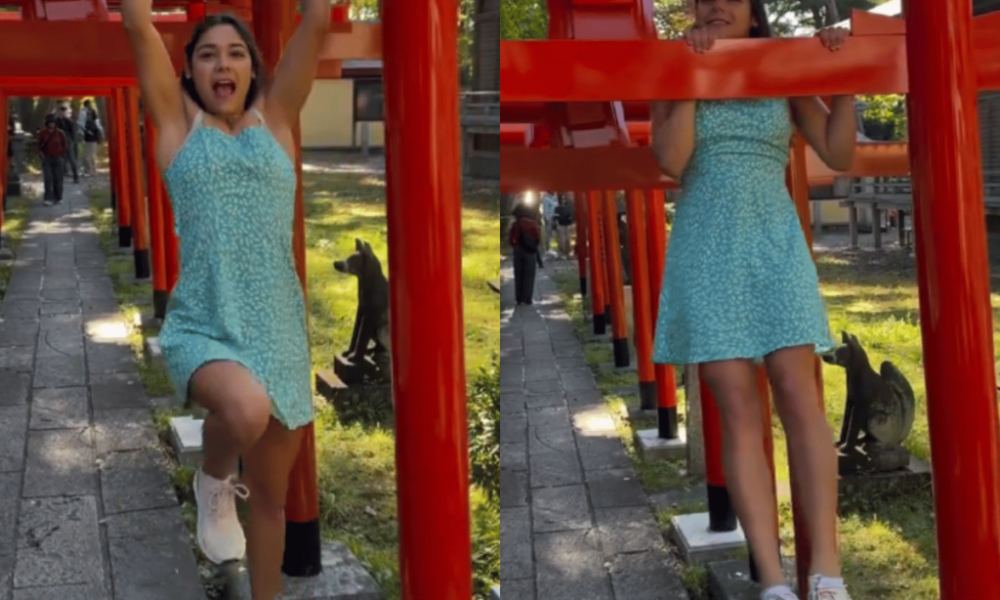Travel
Lack Of Cultural Sensitivity Comes Into Question After Influencer Uses Sacred Shinto Gate For Workout
Chilean influencer sparks outrage by using a sacred Shinto gate to do pull-ups while travelling in Japan; the lack of cultural sensitivity by many travelling influencers comes back into discussion.

In an era where content creation knows no borders, a recent incident in Japan has reignited discussions about cultural sensitivity and social media responsibility. A Chilean gymnast and influencer, Maria del Mar ‘Marimar’ Perez Banus, sparked widespread outrage by using a sacred Shinto gate (Torii) as exercise equipment for a workout video. This incident serves as a stark reminder of the critical need for cultural awareness in our interconnected world.
The recent incident that went viral
The video, which showed Perez performing pull-ups on a Torii gate while dancing to “Cha Cha Slide,” demonstrated a fundamental misunderstanding of Japanese cultural heritage. Torii gates are not mere architectural features; they represent the sacred boundary between the secular and spiritual worlds in Shinto tradition. The influencer’s actions, though likely unintentional, struck a deeply discordant note with Japanese cultural sensitivities. Despite her subsequent apology video stating, “I didn’t mean to be rude. I’m really sorry for what I did without thinking,” the incident highlights a broader issue in influencer culture: the prioritization of content creation over cultural respect.
バカな外国人🇨🇱女性さん、鳥居で懸垂をし始める😅🦁
— Masa (@masanews3) October 14, 2024
Instagram @mmgymsisters pic.twitter.com/3bbfVfeeY5
Apologies are not enough..
As social media platforms continue to connect people across cultures, influencers face a unique responsibility. Their reach extends far beyond their home countries, making cultural sensitivity not just an option but a necessity. This global platform demands a deep understanding of and respect for diverse cultural norms. Before creating content in a foreign location, thorough research into local customs, traditions, and the significance of religious and cultural symbols becomes paramount. What might seem like an innocent backdrop for content creation could hold profound spiritual or cultural significance for local communities.
The challenge for modern content creators extends beyond mere awareness. Sacred spaces, historical sites, and religious symbols carry deep meaning for local communities and should never be reduced to mere props for social media content. The viral nature of social media means that any misstep can rapidly escalate into an international incident, causing harm to both the local communities and the influencer’s reputation. Good intentions, while important, do not negate the impact of culturally insensitive actions.
Respecting local customs, laws, etc is non-negotiable
For influencers navigating this global landscape, engaging with local guides and cultural experts can provide invaluable insights and help avoid potentially offensive content. When in doubt, consulting with local communities about appropriate behavior should become standard practice. More importantly, influencers should view these interactions as opportunities to educate their followers about diverse cultures rather than simply seeking engagement through exotic locations.
The path forward requires a fundamental shift in how influencers approach content creation in foreign cultures. Cultural competency should be viewed as an essential professional skill, not an optional add-on. This means developing a genuine interest in and respect for local customs, traditions, and sensitivities. Successful content creators understand that respecting local customs enhances rather than limits creative possibilities. By building meaningful relationships with local communities and sharing authentic cultural experiences, influencers can create content that both engages and educates their audience.
Prevention of cultural insensitivity requires more than just avoiding mistakes; it demands a proactive approach to understanding and appreciating different cultures. When influencers treat locations and cultures with respect, they can create content that not only entertains but also bridges cultural divides. This approach benefits both the content creator and their audience, fostering greater global understanding and appreciation of diverse cultural heritage.
The Shinto gate incident is a lesson on the way forward for influencers..
The Torii gate incident serves as a valuable lesson for content creators worldwide. In our quest for engaging content, we must never lose sight of the fundamental respect due to local customs, religious sentiments, and cultural heritage. As social media continues to shrink our world, the success of global content creators will increasingly depend not just on their ability to engage audiences, but on their capacity to do so while honoring and respecting the diverse cultures they encounter.
For influencers, the message is clear: cultural sensitivity is not an obstacle to content creation—it’s an essential element of responsible global citizenship in the digital age. By embracing this responsibility, content creators can help build a more respectful and understanding online community while still achieving their creative and professional goals. The future of influential content creation lies not in exploiting cultural differences for views, but in celebrating and respecting them while creating meaningful connections across cultural boundaries.
